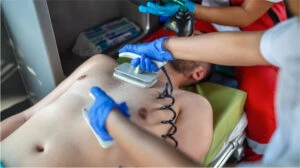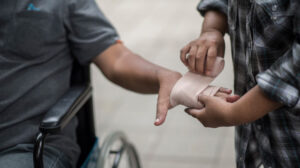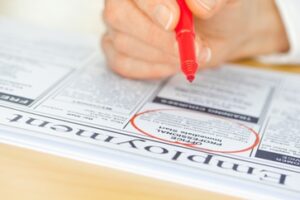
With 250,000 people dying from sudden cardiac arrest annually, the topic of automated external defibrillators (AEDs) is becoming more relevant to the news media. An AED can save the life of someone experiencing sudden cardiac arrest if used within minutes of onset.
For every minute a defibrillator is not used during a sudden cardiac arrest, the American Heart Association estimates that the chance of surviving decreases by ten percent. So using an AED is very important. AEDs must be kept in public places such as schools and arenas. In Louisiana, the state passed legislation requiring AEDs to be placed in public places. These laws address the need for a fast reaction to sudden heart attacks in these locations.
The “automated external defibrillator, “or “AED,” a portable life-saving device, allows trained nonmedical personnel to treat a patient immediately, preventing as many as 50,000 deaths from happening each year. This means that a trained employee of any business could save a customer’s life who experiences sudden cardiac arrest. It’s simple to see the tremendous potential of the AED.
Unfortunately, state requirements for keeping AEDs available in public places like schools or arenas vary widely. If you find yourself suffering from a heart attack somewhere without one, you might miss out on an opportunity to be saved. Our team of AED injury attorneys at the Scott Vicknair LLC understands your legal rights, and we are committed to getting you the compensation you deserve. We do everything possible to help you recover from your injuries and get back to living your life.
Public Places and AED Injury Liability
At the state level in Louisiana, some laws have been enacted to require AEDs to be present in certain public places. Schools, for example, must have an AED available to participate in certain sporting events, including most public schools and universities.
Under the right conditions, other places that might be required to have an AED on-site might include:
- Golf courses
- NCAA and high school athletic programs
- Airports
- Sports stadiums (including high school sporting events)
- Gyms
- Theme parks
- Dentist’s offices
- Medical offices
- Nursing homes
Injured on Someone Else’s Property?
Know Your RightsOur expert premises liability lawyers will help you hold negligent property owners accountable.
Get a Free Case Evaluation
504-500-1111Automatic External Defibrillator AED Liability
Automatic External Defibrillator (AED) Liability is a big concern in the healthcare industry. AEDs are portable devices that deliver an electric shock to the heart in cases of sudden cardiac arrest (SCA) to restore its normal rhythm. While AEDs have proven to be life-saving devices, their usage also raises legal and liability issues for manufacturers, distributors, and users.
Manufacturer Liability
Manufacturers of AEDs have a potential liability for product defects or malfunctions. These companies have a responsibility to design, manufacture, and distribute AEDs that are safe and effective for use by laypersons or healthcare professionals. If an AED malfunctions due to design flaws, manufacturing defects, or inadequate warnings, the manufacturer may be held liable for any resulting injuries or deaths. This includes failures related to the device’s electrical components, battery performance, software glitches, or faulty electrode pads.
Distributor Liability
Distributors of AEDs also have a degree of liability. They have a duty to ensure that the AEDs they supply are in proper working condition and have not been tampered with or damaged during transport. Failure to adequately inspect, test, or maintain AEDs before distributing them can result in liability if a malfunctioning device contributes to harm or death.
Liability extends to those responsible for AED maintenance and training programs. Regular maintenance and testing of AEDs are crucial to ensure their readiness in emergency situations. If negligent maintenance, improper storage, or lack of routine inspections lead to device failure, the person or entity responsible for maintenance can be held liable for any resulting harm.
Automatic external defibrillator AED Liability can also extend to individuals who use or attempt to use an AED. Good Samaritan laws in many jurisdictions offer some protection to lay rescuers who use AEDs in emergencies. These laws generally shield individuals from liability if they act in good faith, without compensation, and in accordance with their level of training or knowledge. However, if an individual acts recklessly or with gross negligence when using an AED, they may still face potential liability for any harm caused.
Reducing Liability Risks
To reduce liability risks, it’s important for manufacturers, distributors, and users of AEDs to adhere to certain best practices. Manufacturers should conduct rigorous testing and quality control procedures throughout the development and production process. They should also provide clear and comprehensive instructions for use, including proper maintenance protocols.
Distributors should implement thorough inspection procedures to ensure that AEDs are in working order before distributing them. They should also provide training and support to end-users, emphasizing the importance of regular maintenance and testing.
AED users should receive proper training on AED operation, including how to recognize SCA, perform CPR, and use the device correctly. Regular refresher training sessions are recommended to maintain proficiency. Users should also follow any manufacturer-recommended maintenance schedules and promptly report any concerns or malfunctions to the appropriate parties.
Automatic external defibrillator AED liability is a complicated matter that involves multiple parties and considerations. Manufacturers, distributors, and users all have a role to play in minimizing liability risks associated with AEDs. If you have additional questions about AED, contact a lawyer from Scott Vicknair, LLC.
AED Locations
Automatic external defibrillator AED liability is still a big concern these days. The use of automated external defibrillators (AEDs) has become increasingly prevalent in public spaces, providing life-saving interventions in cases of sudden cardiac arrest. While AEDs undoubtedly save lives, their presence in various locations also brings forth the question of liability in case of injuries or adverse incidents. Although the majority of AED deployments occur without incident, it is important to recognize and address the common places where potential AED injury liability may arise.
Educational Institutions
One common place for AED deployment is in educational institutions, such as schools and universities. These institutions are responsible for the safety and well-being of their students, faculty, and staff. While AEDs can prove to be invaluable during cardiac emergencies, the risk of liability arises if there is a failure to properly maintain or regularly inspect these devices. Negligence in the upkeep of AEDs, including expired batteries or pads, poor training for staff, or a lack of proper signage, may lead to liability if someone suffers harm as a result.
Recreation Facilities
Another setting where AEDs are commonly found is in recreational facilities, including gyms, sports arenas, and swimming pools. These venues attract a wide range of individuals engaging in physical activities, making them potential hotspots for cardiac emergencies. However, the responsibility falls on the facility owners and operators to ensure that AEDs are accessible, maintained, and in good working condition. Failure to fulfill these responsibilities may result in automatic external defibrillator AED liability.
Public Spaces
Public spaces such as airports, shopping malls, and train stations often have AEDs readily available. The responsibility for liability in these locations is shared among the entities involved, including the facility owners, AED manufacturers, and emergency medical services. Adequate signage, regular inspections, and ensuring the presence of trained personnel are crucial in minimizing liability risks. Failure to adhere to safety protocols and guidelines may expose these entities to potential liability if an individual suffers harm during a cardiac emergency.
Workplaces
Another consideration is the use of AEDs in workplaces. Many companies and organizations have recognized the importance of having AEDs on-site to protect their employees and visitors. However, liability concerns can arise if an employer fails to implement proper AED training programs, maintain the devices, or create an effective emergency response plan. In the event of an injury or death, inadequate preparation or negligent actions could lead to potential liability for the employer.
AED Training
In all these settings, it is vital to realize the importance of AED training for individuals who may be called upon to use these devices. Proper training not only ensures the effective and safe use of AEDs but also reduces the potential for liability. Organizations should provide regular training sessions, refresher courses, and certification programs to maintain a competent and prepared workforce capable of utilizing AEDs appropriately.
If you suffered a heart attack in a place without an AED, you may be able to sue for automatic external defibrillator AED liability. Schedule a consultation with a lawyer from Scott Vicknair, LLC to discuss your cas in detail.
Hiring a Lawyer
Hiring a lawyer for Automatic External Defibrillator (AED) liability issues can provide numerous benefits to individuals and organizations. With the increasing use of AEDs in public and private spaces, it is essential to understand the potential legal ramifications associated with their deployment. A skilled lawyer specializing in AED liability can provide valuable guidance and support in navigating the complex legal landscape, ensuring protection and peace of mind for all parties involved.
A lawyer with knowledge in AED liability matters can help individuals and organizations understand their legal obligations. They possess a deep understanding of the applicable laws and regulations governing AED usage, such as those related to maintenance, training, and accessibility. By educating their clients about these legal requirements, lawyers can help prevent potential liabilities and ensure compliance with the law.
A lawyer can also assist in mitigating risks associated with AED deployment. They can review contracts, insurance policies, and liability waivers to ensure that their clients are adequately protected in case of an AED-related incident. This can help prevent costly legal disputes and potential financial losses.
Crucial Legal Support & Guidance
In the unfortunate event of an AED-related incident or lawsuit, a lawyer can provide crucial legal representation. They have the expertise to deal with complicated legal processes, including investigating the incident, gathering evidence, and building a strong defense. With their knowledge of relevant case law and precedents, lawyers can effectively advocate for their clients’ interests and navigate the intricacies of the legal system.
Hiring a lawyer can help expedite the resolution of AED liability disputes. These professionals possess the negotiation skills necessary to engage in discussions with opposing parties, such as injured individuals or their legal representatives. By reaching a fair and swift settlement, a lawyer can help their clients avoid protracted litigation, saving time, money, and reputation.
AED liability lawyers also bring valuable expertise in risk management and prevention. They can assist individuals and organizations in developing comprehensive AED policies and protocols that promote safety and minimize legal exposure. This includes advising on proper AED maintenance, staff training, and emergency response procedures. By proactively addressing potential issues, lawyers can help their clients reduce the likelihood of AED-related incidents and subsequent legal liabilities.
By working with a lawyer, individuals and organizations can gain access to a vast network of legal resources and expert witnesses. These connections can prove invaluable when assessing liability, evaluating the severity of injuries, or challenging claims made by opposing parties. Leveraging their professional networks, lawyers can assemble a strong legal team to support their clients’ defense and increase the likelihood of a favorable outcome.
The benefits of hiring a lawyer for automatic external defibrillator AED liability matters cannot be overstated. They provide essential legal guidance, assist in risk mitigation, and offer expert representation in the event of a lawsuit. By understanding the legal obligations surrounding AED deployment, individuals and organizations can avoid potential liabilities and ensure compliance with the law. With their expertise in negotiation and risk management, lawyers can help expedite dispute resolution and minimize legal exposure.


